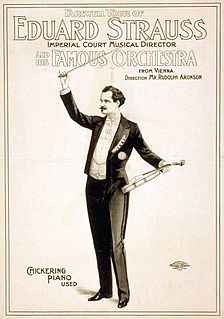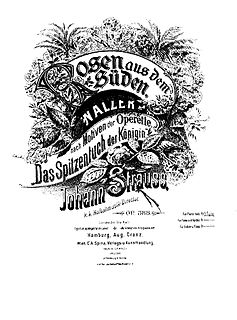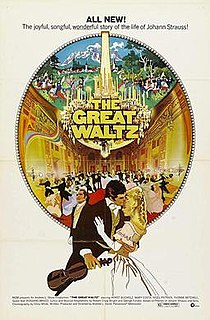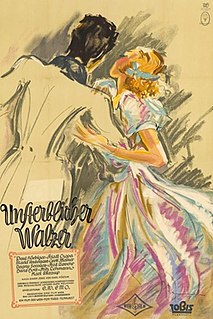
Johann Baptist Strauss II, also known as Johann Strauss Jr., the Younger, the Son, was an Austrian composer of light music, particularly dance music and operettas. He composed over 500 waltzes, polkas, quadrilles, and other types of dance music, as well as several operettas and a ballet. In his lifetime, he was known as "The Waltz King", and was largely responsible for the popularity of the waltz in Vienna during the 19th century. Some of Johann Strauss's most famous works include "The Blue Danube", "Kaiser-Walzer", "Tales from the Vienna Woods", "Frühlingsstimmen", and the "Tritsch-Tratsch-Polka". Among his operettas, Die Fledermaus and Der Zigeunerbaron are the best known.

Johann Baptist Strauss I was an Austrian composer of the Romantic Period. He was famous for his light music, namely waltzes, polkas, and galops, which he popularized alongside Joseph Lanner, thereby setting the foundations for his sons—Johann, Josef and Eduard—to carry on his musical dynasty. He is best known for his composition of the Radetzky March.

The Ländler is a folk dance in 3
4 time which was popular in Austria, Bavaria, German Switzerland, and Slovenia at the end of the 18th century.

Josef Strauss was an Austrian composer.

Oscar Nathan Straus was a Viennese composer of operettas, film scores, and songs. He also wrote about 500 cabaret songs, chamber music, and orchestral and choral works. His original name was actually Strauss, but for professional purposes he deliberately omitted the final 's'. He wished not to be associated with the musical Strauss family of Vienna. However, he did follow the advice of Johann Strauss II in 1898 about abandoning the prospective lure of writing waltzes for the more lucrative business of writing for the theatre.
George Forrest was an American writer of music and lyrics for musical theatre best known for the show Kismet, adapted from the works of Alexander Borodin. He was also known professionally at times as Chet Forrest.

Eduard "Edi" Strauss was an Austrian composer who, together with his brothers Johann Strauss II and Josef Strauss made up the Strauss musical dynasty. He was the son of Johann Strauss I and Maria Anna Streim. The family dominated the Viennese light music world for decades, creating many waltzes and polkas for many Austrian nobility as well as dance-music enthusiasts around Europe. He was affectionately known in his family as 'Edi'.

The Great Waltz is a musical conceived by Hassard Short with a book by Moss Hart and lyrics by Desmond Carter, using themes by Johann Strauss I and Johann Strauss II. It is based on a pasticcio by Erich Wolfgang Korngold and Julius Bittner called Walzer aus Wien, first performed in Vienna in 1930. The story of the musical is loosely based on the real-life feud between the older and younger Strauss, allegedly because of the father's jealousy of his son's greater talent.

Rathausball-Tänze op. 438 is a waltz by composer Johann Strauss II written in 1890 in honour of the inauguration of the new city hall of Vienna. At the opening of the new banqueting hall (Festsaal) on 12 February 1890 two rival orchestras were commissioned to provide dance music for the occasion; the Strauss Orchestra under the direction of Eduard Strauss, and that of rival Kapellmeister Karl Michael Ziehrer who was head of the Vienna House Regiment 'Hoch und Deutschmeister No. 4'.
Gross-Wien Op. 440 is a waltz by Johann Strauss II written in 1891 and was a choral waltz for the Wiener Männergesang-Verein during the Vienna Fasching (Carnival) of the same year. The text for the choral version of the waltz was by Franz von Gernerth.

Rosen aus dem Süden, Op. 388, is a waltz medley composed by Johann Strauss II in 1880 with its themes drawn from the operetta Das Spitzentuch der Königin. Strauss dedicated the waltz to King Umberto I of Italy.

"Frühlingsstimmen", Op. 410 is an orchestral waltz, with optional solo soprano voice, written in 1882 by Johann Strauss II.
Studentenlust op. 285 is a waltz by Johann Strauss II composed in 1864. The waltz was written as a dedication piece for the Students' Ball held in the Redoutensaal of the Imperial Hofburg Palace on 31 January of that year.

The Great Waltz is a 1938 American biographical film based very loosely on the life of Johann Strauss II. It starred Luise Rainer, Fernand Gravet (Gravey), and Miliza Korjus. Rainer received top billing at the producer's insistence, but her role is comparatively minor as Strauss' wife, Poldi Vogelhuber. It was the only starring role for Korjus, who was a famous opera soprano and played one in the film.

Waltzes from Vienna is a 1934 British biographical film directed by Alfred Hitchcock, sometimes known as Strauss' Great Waltz. It was part of the cycle of operetta films made in Britain during the 1930s.

Robert Elisabeth Stolz was an Austrian songwriter and conductor as well as a composer of operettas and film music.
The Johann Strauss Orchestra is a pops orchestra founded in the Netherlands by André Rieu in 1987. The orchestra is well known for performing classical works with a distinctly unorthodox frivolity, joking with the audience and performing all sorts of antics.

The Great Waltz is a 1972 American biographical musical film directed by Andrew L. Stone, and starring Horst Buchholz, Mary Costa, and Nigel Patrick, that follows 40 years in the life of composer Johann Strauss and his family. It is based on the musical The Great Waltz, and was Stone's final film. M-G-M released a previous film adaptation in 1938, which is about a different phase of the younger Strauss's life.

Immortal Waltz is a 1939 historical drama film directed by E. W. Emo and starring Paul Hörbiger, Dagny Servaes, and Maria Andergast.
The Emperor Waltz or Emperor Waltz may refer to:














